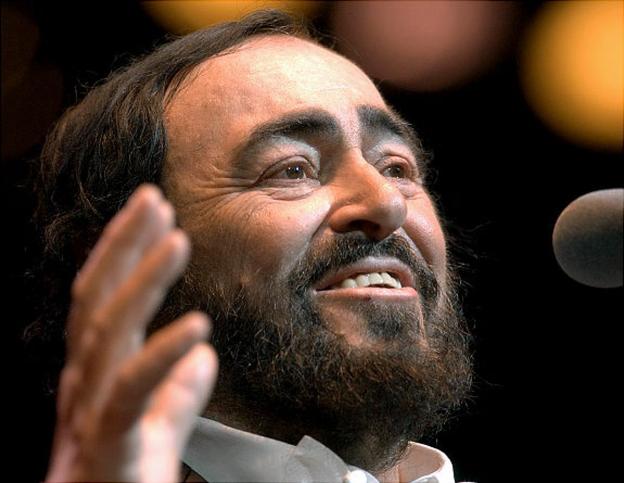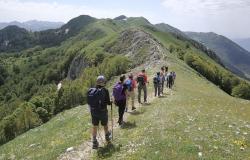"Mamma mia, che acuti!"
These were the words of the doctor when Luciano Pavarotti was born, screaming in his mother’s arms, on October 12, 1935 in Modena. Both Adele and Fernando Pavarotti, Luciano’s parents, had been born into large families and they were very close, a real traditional Italian family. In the building where he grew up, 16 families shared, mostly relatives. He was the only boy at the time which meant he received the attention of everyone, especially the women, and he loved women throughout his life. He had a wonderful relationship with his grandmother, Nonna Giulia, whose daughter Lucia had died the year before he was born and after whom he was named. Luciano’s father worked in a Modena bakery and his mother in a cigar factory leaving him in the care of his grandmother. Fernando was excused military service because his trade was of use to the fascists. The bakery helped to feed the German troops. The family never went hungry because there was always bread.
During the war, the bombings became too dangerous, so the family stayed with a farmer in Gargallo near Carpi, where Luciano learned about the land and animals and where his love for both was instilled in his heart forever.
At five, he was already singing and entertaining the neighbours. He also loved football and spent long hours playing soccer and being sociable with the other children of the neighbourhood, and he sang, though his father was not keen to encourage him. Luciano had the potential to enter a career as an athlete, however, eventually, after much deliberation and many meetings round the family table, a deal was struck. The family would support him in his singing until he was 30 and, if he hadn’t made it by then, he would give up his notions to be a singer.
He was 19 when he was taken to his first teacher, Maestro Arrigo Pola, who tutored him free, knowing the family’s circumstances. Endless hours of exercises for the muscles and voice were practised, towards the aim of him becoming primo tenore. The importance of this preparation was essential to develop a voice capable of surviving the strenuous operatic works.
When Arrigo took a post in Japan, he sent him to Ettore Campogalliani of Mantua. Mirella Freni, a pupil from his Modena school, was also being tutored with Ettore. Luciano needed an income and took a part-time job teaching in the school, not for long though as he found a job selling insurance, which was more profitable. Unfortunately, after making good money, his voice was taking strain from excessive talking as a salesman. He decided to leave the business and focus on his career. What a loss it would have been had he made a career from selling insurance.
After six years and still no major singing parts, he began to be disillusioned and was ready to give up if his booking at the Salsomaggiore in Parma was not a success. It turned out to be the best performance he had ever done thus far. It was a great success, and he went on to enter and win the “Achille Peri” competition for young singers in 1961. The first prize was the role of Rodolfo in Puccini’s La Bohème at the Teatro Municipale in Reggio Emillia, directed by Mafalda Favero. At the performance, he was noticed by an agent, former tenor Alessandro Ziliani, who was to help him establish his career.
In 1961, he was feeling more positive about the future, so he married Adua Veroni whom he had met while studying at the Istituto Magistrale. They had three daughters together, Lorenza, Cristina and Giuliana. He was a great family man and loved to entertain friends at home. Opera was not his only love. He loved food and cooking. His escape was to paint, or to ride a motorcycle, and he loved horses.

Influences and milestones
His father was his first influence. Fernando had a wonderful voice and in fact father and son often sang together, earlier in Llangollen, Wales, at the International Eisteddfod, and later Fernando often had smaller parts in productions with Luciano. Fernando introduced him to recordings of the great voices of the time: Beniamino Gigli, Martinelli, Tito Schipa and Enrico Caruso. Luciano’s favourite was Giuseppe Di Stefano and it was only fitting that in 1963, when Di Stefano was unable to perform, Luciano replaced him to play Rodolfo in Rigoletto at the Royal Opera House in Covent Garden. Pavarotti credits Joan Ingpen, from the Opera House, with discovering him and bringing him to London for the first time to cover for Stefano.
Pavarotti’s successful debut began to open new opportunities. He was invited to the Glyndebourne Opera Festival, where he learnt to sing Mozart, working alongside Judith Raskin. It was also where Joan Sutherland heard him sing and consequently he was booked for a tour of Australia in 1965 with Joan and her husband Richard Bonynge. Luciano was ever grateful to Joan for helping him develop breathing techniques which allowed him to sing from the diaphragm, so saving his voice from strain.
His international debut was La Traviata in Belgrade in 1963. It was an eventful year. He played Duca di Mantova in Rigoletto at the Vienna State Opera. His American debut was at the Greater Miami Opera in 1965, where he performed in Donizetti’s Lucia di Lammermoor with Joan Sutherland. Donizetti was one of Pavarotti’s favourite composers because, in his words, “my voice likes Donizetti.” In 1964, he sang in the festival production of Idomenea at Glyndebourne with Gundula Janowitz. In 1965, he at last had his La Scala Theatre debut. It was La Bohème with Mirella Freni and conducted by Herbert von Karajan.
His popularity with the public was unique. Luciano had a wonderful natural way with people. He was optimistic and unaffected by status. His “bigness” in stature and voice was magnetic. In 1968, he made his New York Met debut, but being very ill at the time, he felt he had not given the audience his best; however, four years later in 1972, his success at the Met became a reality when he gave a phenomenal performance with Joan Sutherland in La fille du Regiment, Richard Bonynge conducting. This work gave him the title of “King of the High C’s”. His manager Herbert Breslen’s comment on his performance was, “Luciano sang the hallelujah out of it.” He came back for 17 curtain calls. (His record, registered in the Guinness Book of Records, for 165 curtain calls was after the performance L’Elisir d’Amore (1988) in Berlin.)
Pavarotti was probably the first real crossover artist, singing popular music too. He even played with the band U2. His love for opera and his open-hearted nature influenced and popularised opera. Being one of the well-loved “Three Tenors” with Placido Domingo and Jose Carreras, he sang at many events and international concerts. In concert is listed in the Guinness Book of Records 2010 as the “best-selling classical album” of all time.
In 2003, he married his assistant, Nicoletta Mantovani, with whom he already had a daughter, Alice.

Reputation
Pavarotti did, however, have a few complaints. One was about “egos” in opera houses and the other was that he had to make it internationally before he was accepted in his own country. Pavarotti was always careful not to take on a work that was not suitable for his voice. He never overextended his voice, and there were works, such as Othello, which he would not sing until much later. It also meant cancellations were inevitable and, at the Lyric Opera of Chicago, after he cancelled numerous events, Ardis Krainik banned him for life, which caused much controversy and gave Pavarotti the new title of “King of cancellations”.
Charity work, free concerts and legacy
Pavarotti sang in Beirut (the benefit concert after the civil war in 2000), and performed at concerts raising money for earthquake victims and humanitarian causes. He has given many free public concerts to massive audiences, one of which was Hyde Park (1991), which was televised and attended by over 100,000 people. He also formed Pavarotti and friends, musicians from all genres who came together for charity concerts in Modena, raising money for UN causes. Among these musicians were fellow tenor Andrea Bocelli, Eric Clapton, Bono, Bon Jovi, Deep Purple and the Spice Girls. Pavarotti introduced an international voice competition for young singers. He was friends with Princess Diana and supported her charities. Amongst his many awards for humanitarian work, he was given the title of “United Nations Messenger of Peace" in 1998. He was presented with the Grammy Legend Award in 1998.
In 2005, Luciano underwent surgery on two vertebrae and had a difficult recovery. However, in 2006, he performed at the Winter Olympics in Turin. The aria was Puccini’s Nessun Dorma, which had been the theme song for the 1990 Italy World Cup and which had drawn world attention to Pavarotti. The performance was pre-recorded due to the sub-zero temperatures. It was his last concert.
Luciano Pavarotti died on 6 Sept, 2007 after a battle with pancreatic cancer. He will never be forgotten because his voice with its beautiful tone will live on in the many recordings that have been made. Luciano Pavarotti reached his dream to be primo tenore and his voice has become a national “Italian Treasure”.








